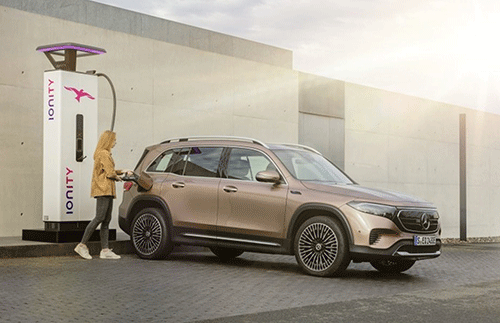As electric vehicles (EVs) become more popular in Namibia due to a steady escalation of fuel prices and the increased scarcity of new vehicles and vehicle parts, many potential EV customers are concerned about the availability of charging stations for alternative forms of personal transport.
M&Z Motors has however quelled these concerns by confirming they will embark on erecting EV charging stations to not only cater for the group’s upsurge of available EVs but to also accommodate electric vehicles of all brands.
According to M&Z Motors spokesperson Aylin Lützow, while there is currently only one EV charging station available, at the M&Z showroom in Windhoek, the group is rapidly investing to expand the EV charging station nationwide within the next 12 to 24 months.
“We will focus on the main routes for convenient long-distance travelling,” Lützow told New Era, adding “the priority of the charging stations and their locations are to be confirmed shortly”.
Also, Lützow explained the charging infrastructure will be erected by a third party and noted the total capital investment will be shared in due course as plans for the nationwide charging stations are finalised.
The move by the M&Z Group comes after last week’s official introduction of the first Mercedez Benz EVs in the country, namely the EQA 250 and EQB 350 4Matic models.
These are the first Mercedes Benz EVs to be introduced to the Namibian.
Lützow noted there are currently a total of three EV ranges, orderable at M&Z Motors, namely the EQA, EQB and EQS, while the range is expected to be extended this year by the further introduction of the EQE, EQE SUV and EQS SUV.
When New Era asked Lützow the duration to fully charge the EQA and EQB models, she explained: “This depends on multiple variables like the rate at which a charging station can charge. The charging station that M+Z has installed has a capacity of 60kw/h, which means 0-100% charging on EQA and EQB takes roughly and slightly over an hour”.
She added: “At home, charging charges at approximately 1.7 to 2 kw/h, which means charging at home from 0-100% can take more than 24 hours, but it has to be considered that 99% of people do not use all the range of the vehicle in one day. So, at home, charging is more convenient, and it is designed to ‘top up’ on charges as opposed to 0-100 charging. It is possible, but it just takes longer”.
Namibia’s first public EV charging station was launched about a year ago at the Grove Mall in Windhoek, where a full charge is estimated to take about 30 minutes.
Other vehicle dealerships, such as BMW, also have an EV charging station on site.
However, more dealerships are preparing for the full advent of EVs in the country, particularly as 11 global automakers pledged at the 26th United Nations climate conference (COP26) to completely phase out the manufacturing and selling of petrol and diesel-powered vehicles by 2035 in leading markets and 2040 worldwide.
These automakers include Ford, Mercedes-Benz, General Motors and Volvo.
Many other carmakers have pledged billions of dollars to establish viable markets for EVs and related components, such as batteries.
EV vs internal combustion engines
Meanwhile, economist at Simonis Storm (SS) Theo Klein in a recent op-ed cautioned that if more countries have a change of heart and make similar pledges, whereas the rest stay true to their promise, Namibia could expect a significant challenge in sourcing petrol- and diesel-powered vehicles in future.
This is because Namibia is a net importer of passenger and commercial vehicles, and it accounts for a minute share of global vehicle sales.
“Some concerns for EVs in Namibia are a lack of charging station infrastructure and a lack of electricity connections in certain remote areas. Another would be the range of batteries. The average distance between popular towns is about 280km, and fully charged batteries provide an average distance of 400km (provided you drive an average of 120km/h). While the range of batteries has increased in recent years, there remains ‘range anxiety’ amongst consumers who want to travel far distances – implying that Evs might primarily be used as city cars and not for inter-regional travel in Namibia,” Klein stated.
Klein added that an affordable option exists for environmentally conscious consumers – and that has seen growing interest from local customers.
“Electric Vehicles Namibia CC offers second-hand Nissan Leaf vehicles, typically costing between N$175 000 and N$210 000, with an average mileage on the clock, ranging between 30 000 and 80 000 kilometres. These cars have been tested on gravel roads in Namibia and performed well, disclaiming critics who argue that they cannot drive on gravel roads. They can drive about 100km on a fully charged battery, which would make them ideal to have as a city car. A full charge on a normal 3-pin 15amp household wall socket takes about six hours. Local insurance companies do provide cover on these cars, which was not always the case,” Klein explained.
The SS economist also analysed the actual benefit of driving EVs by comparing the cost of re-fuelling a petrol tank to recharging an EV.
For the analysis, Klein assumed the average city dweller drives 880km per month in Windhoek and calculated that monthly petrol costs amount to N$1 276 for a petrol-powered car, compared to N$894 for an EV.
“Driving with an EV saves you N$382 (70% of the petrol engine cost) per month. This equates to annual savings of N$4 584 from driving an EV daily within the city. To drive the same distance, petrol prices will have to reduce to N$11.18 per litre to bring the monthly re-fuelling cost in line with recharging an EV’s battery,” said Klein.
– ebrandt@nepc.com.na


